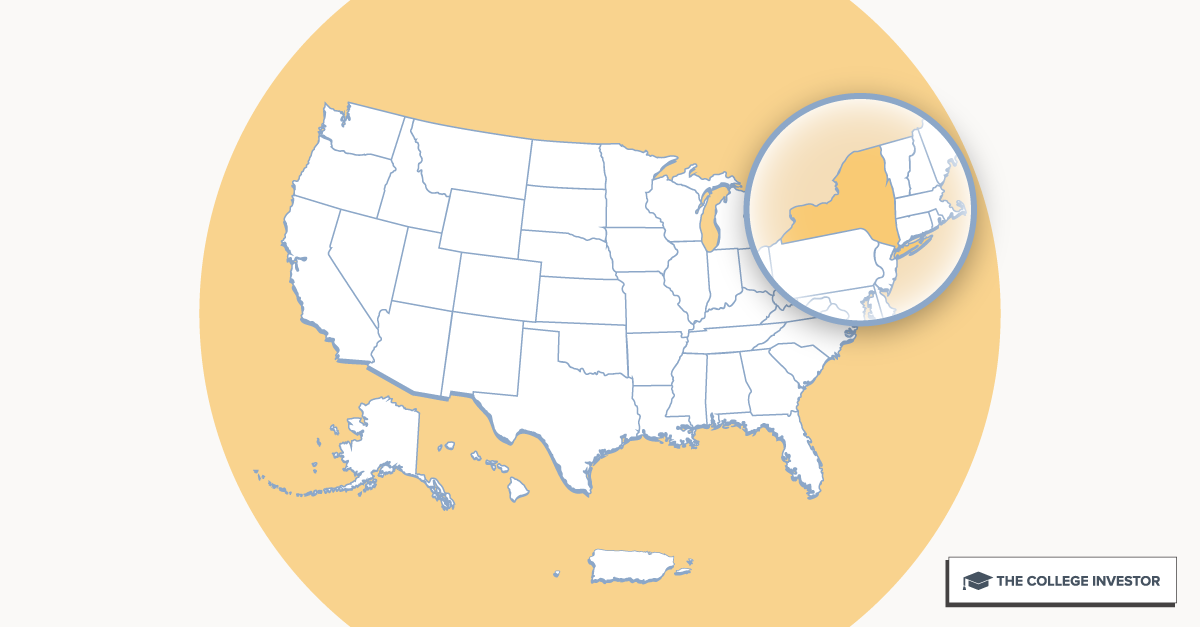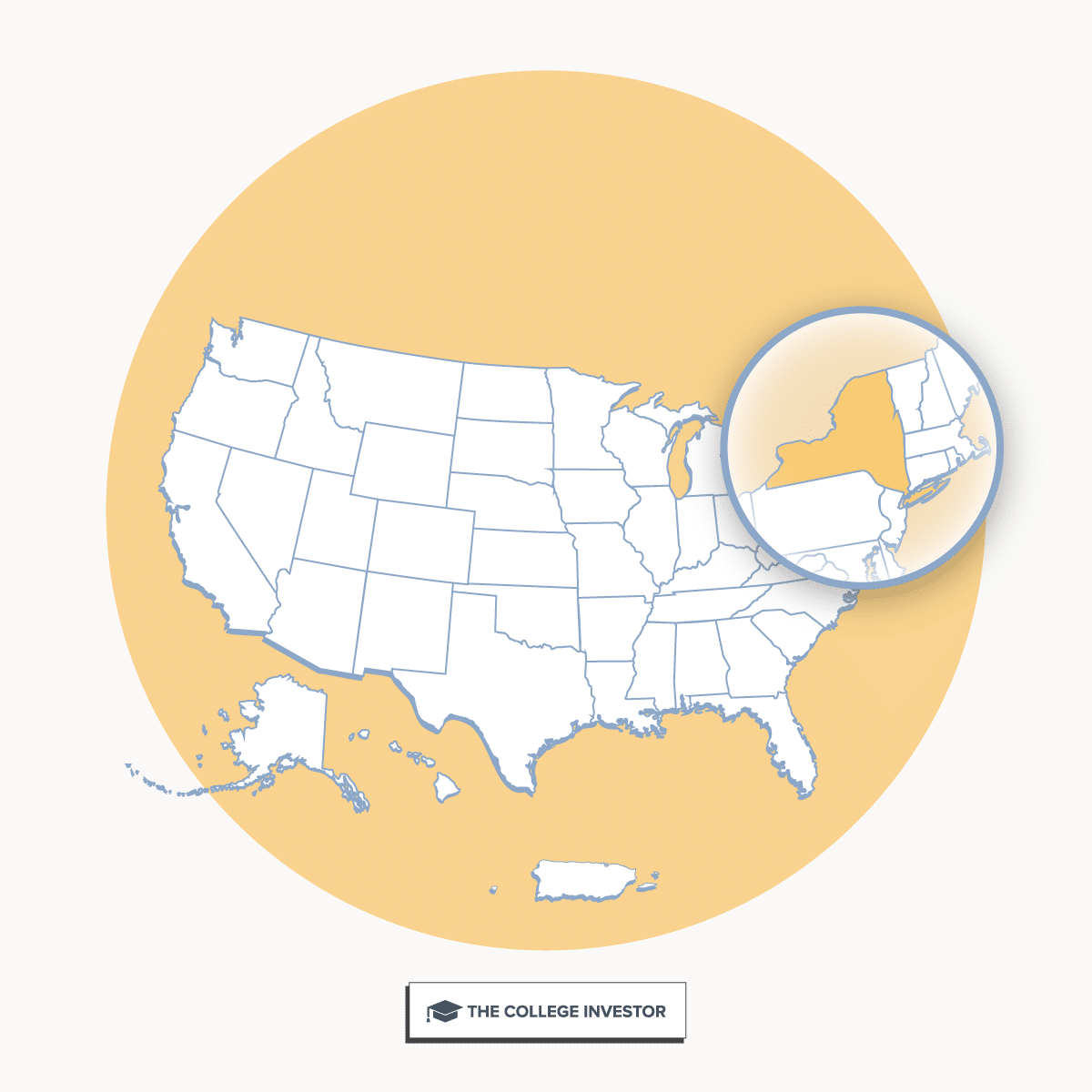New York 529 Plan Rules And College Savings Options

New York has a 529 plan called New York's 529 College Savings Program (NY529) that can help you save for college. New York also has a 529 Able Plan as well.
If you live in New York, these might be good options for you to save for college.
These programs are designed to help make college more affordable - so that you can get the education you need. By saving for college early on, you can make paying for college easier down the road.
If you're not quite sure how 529 plans work, check out this starter guide to What Is a 529 Plan?
There is also a specific order of operations to save for college that we recommend families follow. These programs are specific to the State of New York. Each state has different rules when it comes to 529 plan savings. Here are the New York 529 plan rules.
Average Cost Of College In New York
When saving for college in New York, it's important to take into consideration the cost of attendance in the state. If you choose to go to an out-of-state school, you need to look at the average cost of attendance in that state.
There are 393 colleges and universities in the State of New York.
The total average cost of college (Cost of Attendance) in New York for in-state residents is $22,613 for 2023. This includes tuition, room and board, books and supplies, and other expenses.
For just tuition alone, the average undergraduate tuition for in-state residents is $9,316 for 2023. The cost of tuition in New York has been rising at about 6% per year.
See how this compares to the average cost of college here. Keep in mind the average student loan debt by graduating class here.
Explore the data here.
New York 529 Plan Rules And Tax Information
Tax savings is one of the big benefits of using a 529 plan to save for college. On a federal-level, there is no tax savings for contributions, but qualified distributions are tax-free.
Here are the special tax benefits and considerations for using a 529 plan in New York.
Contributions
New York offers a state tax deduction for contributions to a 529 plan of up to $5,000 for single filers and $10,000 for married filing jointly tax filers.
Minimum: There is no minimum contribution.
Maximum: Accepts contributions until all account balances for the same beneficiary reach $520,000.
Rollovers
Rollovers into the state plan are allowed but not eligible for a tax deduction.
Outbound rollovers are treated as non-qualified withdrawals.
Qualified Distributions
Qualified distributions from a New York and non-New York 529 plan are tax-free.
K-12 Education
New York does not conform with Federal law in regard to using a 529 plan for K-12 tuition. See this guide: Using a 529 Plan For Elementary and High School Private Education.
Student Loans
New York does not conform with Federal law for using a 529 plan for student loans.
Rollover To Roth IRA
New York does not conform with Federal law on outbound rollovers to a Roth IRA.
Non-Qualified Distributions Taxes, Penalties, Recapture
A non-qualified withdrawal from a New York 529 is subject to New York income tax to the extent of prior tax deductions (recapture).
New York 529 College Savings Plan Options
New York has several 529 plan options - one consumer plan and one plan that is sold by financial advisors (we're big advocates of doing-it-yourself, you don't need to pay a financial advisor for this).
New York's 529 College Savings Program
New York's 529 College Savings Program (NY529) is the name of New York's 529 Plan. This plan offers a variety of investment options, including age-based portfolios that become more conservative as the child approaches college, and static investment fund options.
The funds offered include Vanguard.
Fees:
There is a program management fee of 0.12%.
The underlying funds fees are included in the program management fee.
Who Should Use It:
We recommend that New York residents use the New York 529 College Savings Plan due to the tax benefits, low fees, and plan investment options.
We recommend that out-of-state residents consider this plan due to the low fees and investment options.
New York 529 Able Plan Options
529A Able accounts are accounts designed to help those with disabilities escape poverty and save for themselves. Learn more about 529A Able Plans here.
NY ABLE
The NY ABLE Savings Plan is a 529A plan open to all residents in New York.
This plan allows contributions of up to $18,000 per year from all sources.
It does have a minimum initial contribution amount of $25 per account. The minimum subsequent contribution amount is $25.
The plan does have an account maintenance fee of $55 annually, assessed at $13.75 per quarter. It also has a program management fee of 0.36% to 0.38%.
You can open an NY ABLE Plan here.
Other Programs To Save For College
A 529 plan is one way to save for college. Remember, we have a full guide on our approach to college savings here - and it helps you find other options.
If you're looking for ways to boost your college savings, check this out:
Backer
Backer is one of our favorite ways to save for college because they make gifting for college so easy. You can setup an account, link your 529 plan (in most states), and get a unique URL that you can share with friends and family to save for your children's college.
Plus, they have Backer Bucks, which allow you to earn rewards and rebates for the shopping you already do - directly deposited into your children's 529 plan.
Upromise
Upromise is another awesome tool to help you save for college because they have a lot of ways that you can earn money for your 529 plan. You can get rebates and rewards, and you can get cash back into your child's 529 plan by using the Upromise credit card.
New York Financial Aid
Using a 529 plan isn't the only way to save money for college. Each state typically offers a variety of financial aid programs for their residents. These include scholarships and grants, and sometimes unique forgivable student loan opportunities.
Check out the list of New York Student Loan and Financial Aid Programs.
Return to the full list of 529 Plans By State.
Editor: Clint Proctor Reviewed by: Mark Kantrowitz
